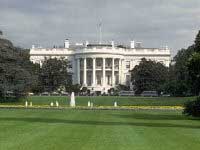
White House Promises a New Era of Sunlight
by Sean Moulton, 1/28/2009

In his first full day in office, President Barack Obama acknowledged the importance of transparency by signing an executive order on the Presidential Records Act (PRA) and issuing memoranda on the Freedom of Information Act (FOIA) and open government standards in general. He further pledged that he would "hold [himself], as president, to a new standard of openness."
Obama issued an order to the Attorney General to draft new FOIA guidelines for agency heads that contain a presumption of openness in making decisions concerning disclosure of information. These guidelines will replace the existing October 2001 memorandum issued by then-Attorney General John Ashcroft that encouraged agencies to withhold information whenever there was a "sound legal basis" to do so. Obama's instructions mandate that "the presumption of disclosure should be applied to all decisions involving FOIA."
It remains to be seen what the new Attorney General memorandum will say. It may return government to the standard established by then-Attorney General Janet Reno's October 1993 memorandum, or it may set new and possibly more progressive standards for FOIA openness. Reno required that "the principle of openness in government [be] applied in each and every disclosure and nondisclosure decision that is required under the Act." Her memo instructed agencies to use FOIA exemptions only where "the agency reasonably foresees that disclosure would be harmful to an interest protected by that exemption." In other words, the policy was to disclose information if there was no foreseeable harm, even if there might be an argument to be made that an agency could legally withhold the information. The Ashcroft memo flipped this, telling agencies that they should obstruct disclosure if they could make a sound legal argument; thus, the "foreseeable harm" standard set by Reno was replaced with a "sound legal basis" standard by Ashcroft. Ashcroft told agencies that the Justice Department "will defend your decisions" to withhold records, in whole or in part, under FOIA.
Obama remarked in his FOIA memo that "the presumption of disclosure also means that agencies should take affirmative steps to make information public." In the past, FOIA memos have focused on providing guidance to agencies on responding to requests. If the new guidance under Obama includes requirements to proactively post information online, prior to receiving a request, it would be a significant change in FOIA policy.
Obama also issued an executive order limiting an incumbent president's ability to restrict public access to presidential records. The measure repealed President George W. Bush's Executive Order 13233, which created an unlimited delay in releasing records of former presidents beyond the previously held 12-year mandatory disclosure period. Before an incumbent president can withhold material under the PRA, he or she must now consult with the Attorney General, the Archivist of the United States, and White House counsel.
Most importantly, Obama also set forth his broad vision for government openness, going beyond mere compliance with existing disclosure laws. The president mandated that the Chief Technology Officer, along with the Director of the Office of Management and Budget (OMB) and the Administrator of General Services, develop an Open Government Directive in the next 120 days. This directive will be designed to establish actions to be taken by agencies in an effort to move toward a government that is transparent, participatory, and collaborative. Not only did Obama promise to increase disclosure of information, but he pledged to do so in a timely manner and in forms that the public can easily find and use. This includes the increased use of new media and Internet technologies, as well as greater efforts to solicit public input. The order did not specify what actions should be included to achieve these goals or how they should be implemented.
The declarations made by the president reflect key recommendations made in a report published by OMB Watch in November 2008, Moving Toward a 21st Century Right to Know. Several groups involved in the creation of that report have lauded the president's first steps toward greater government transparency. Rick Blum of the Sunshine in Government Initiative stated that these declarations "will help keep the public informed in our technology-driven, connected society. On open government, the dawn is breaking."
However, the report also detailed actions that should be taken by the president and Congress in order to create a "culture of openness" within agencies. While presidential orders can establish new requirements, overcoming entrenched attitudes of secrecy will require new incentive and enforcement mechanisms and ongoing emphasis on transparency as a performance issue. Also, any actions taken by the administration are vulnerable to being overturned by future administrations if not protected by legislation. This makes congressional action on transparency vital to ensuring that new mechanisms for openness are available to future generations.


